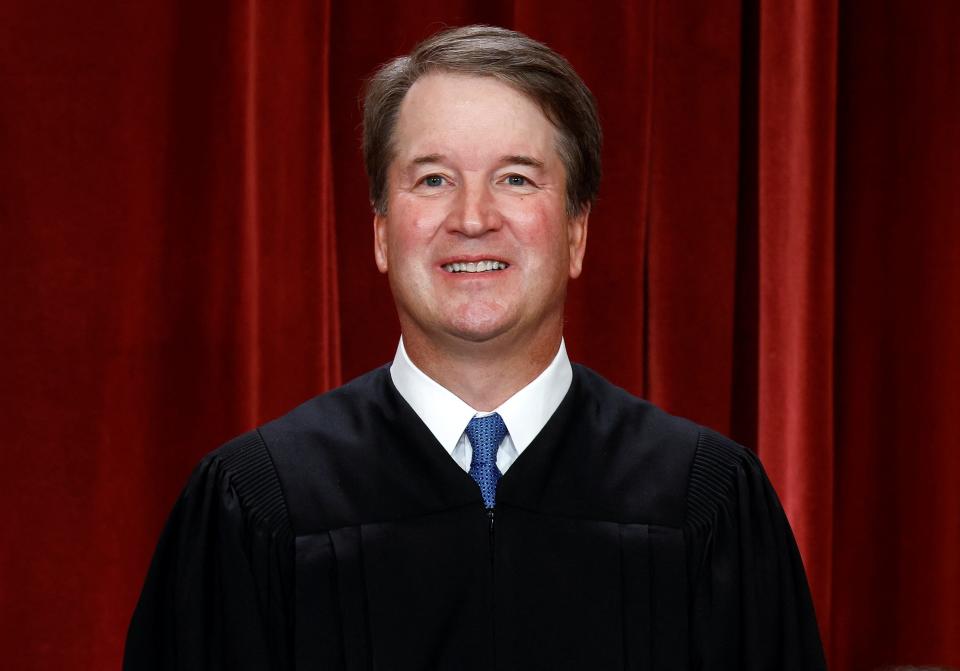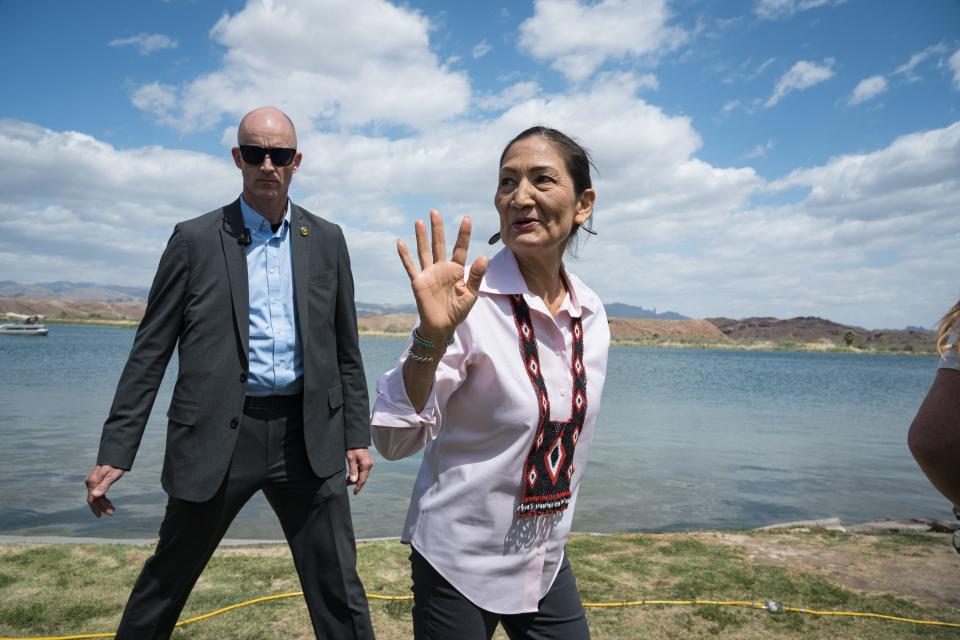Florida sports betting challenge turned down by U.S. Supreme Court
- Oops!Something went wrong.Please try again later.
In a major win for the Seminole Tribe, the U.S. Supreme Court on Monday refused to upend a 30-year, multibillion-dollar deal giving the tribe control of sports betting throughout Florida.
The Supreme Court declined to take up a challenge filed by two pari-mutuel companies. The order, as is typical, did not explain the justices’ reasons, but it said Justice Brett Kavanaugh supported taking up the case. Justice Ketanji Brown Jackson recused herself.

The decision keeps in the Seminoles’ hands control of online sports betting, which was included in a 2021 deal signed by Gov. Ron DeSantis and Seminole Tribe of Florida Chairman Marcellus Osceola Jr. and approved by the Legislature.
A spokesman for the Seminoles said the tribe “applauds” the Supreme Court decision. The gambling deal, known as a compact, could reap Florida at least $2.5 billion over the first five years — and billions of dollars in the future.
“It means members of the Seminole Tribe and all Floridians can count on a bright future made possible by the compact,” spokesman Gary Bitner said in an email.
The Supreme Court decision could cement the tribe’s control of sports betting indefinitely, according to experts.
“For the foreseeable future, the status quo will remain in place, for at least several years, if not 30,” Daniel Wallach, an attorney who specializes in online gambling, told The News Service of Florida.
The case was focused on a “hub-and-spoke” system in the deal allowing the Seminoles to accept bets anywhere in the state, with the wagers run through servers on tribal land. The deal said bets “using a mobile app or other electronic device shall be deemed to be exclusively conducted by the tribe.”

U.S. Department of the Interior Secretary Deb Haaland, whose agency oversees tribal gambling, allowed the deal to go into effect.
Lawyers for the pari-mutuel companies West Flagler Associates and Bonita-Fort Myers Corp. filed a federal lawsuit challenging her decision, arguing that the compact violates a federal law known as the Indian Gaming Regulatory Act, or IGRA, because it authorizes gambling off tribal lands.
A federal district judge agreed with the pari-mutuel companies in 2021, but a three-judge panel of the U.S. Circuit Court of Appeals for the District of Columbia in June reversed her ruling. The companies in February filed a petition seeking review at the Supreme Court after the full appellate court refused to reconsider the panel’s decision.

West Flagler holds three jai alai licenses and Bonita-Fort Myers Corp. does business as Bonita Springs Poker Room in Southwest Florida. The companies alleged the Seminoles’ sports-betting operations will hurt their revenue. Representatives of the companies did not comment when asked Monday.
Under the three-decade compact, the Seminoles agreed to pay Florida about $20 billion, including $2.5 billion over the first five years.
The deal also authorized the Seminoles to offer craps and roulette at their casinos and to add three casinos on tribal property in Broward County. It also allowed pari-mutuels to contract with the Seminoles and share revenue from sports betting.
The tribe in November rolled out a sports-betting app and in December launched craps and roulette at its casinos.
The Seminoles began making payments to the state in January and have paid more than $357 million under the revenue-sharing agreement, including a payment made Monday, according to Bitner.
As the federal lawsuit wound its way through the courts, the companies and an owner, Isadore Havenick, asked the Florida Supreme Court to rule on whether the sports-betting arrangement violated part of the state Constitution requiring voter approval of gambling expansions.
In March, justices unanimously ruled that the companies could not make their case directly to the Florida Supreme Court.
The decision did not address the merits of the lawsuit, but it turned down the companies’ petition for what is known as a “writ of quo warranto,” which means “by what authority” in Latin.
In the 11-page opinion, Justice Meredith Sasso cited a 1920 ruling that said quo warranto has been used to “test the right of a person to hold an office of franchise or exercise some right or privilege the peculiar powers of which are derived from the state.”
“But quo warranto is not and has never been, the proper vehicle to obtain a declaration as to the substantive constitutionality of an enacted law. For that reason, we deny the petition because the relief that petitioners seek is beyond what the writ of quo warranto provides,” Sasso wrote.
If they decide to continue fighting the sports-betting deal, the pari-mutuels could file a state challenge in circuit court. Also, they still could have other federal legal avenues, Wallach said.
The companies could challenge the compact on federal equal-protection grounds, according to Wallach. The companies also could challenge a rule adopted by the U.S. Department of the Interior earlier this year that allows states to enter compacts similar to Florida’s with Indian tribes.
Meanwhile, Wallach predicted the U.S. Supreme Court’s order Monday “will have repercussions that go beyond online sports” and could pave the way for a massive expansion of online betting.
“It will accelerate Florida’s path to online casino gaming, using the same compact language and potentially as early as next year or 2026,” Wallach said. “Within Florida, this seemingly removes a sizable barrier to i-gaming under Seminole Tribe control.”
©2024 The News Service of Florida. All rights reserved.
This article originally appeared on Naples Daily News: Florida sports betting challenge turned down by U.S. Supreme Court

